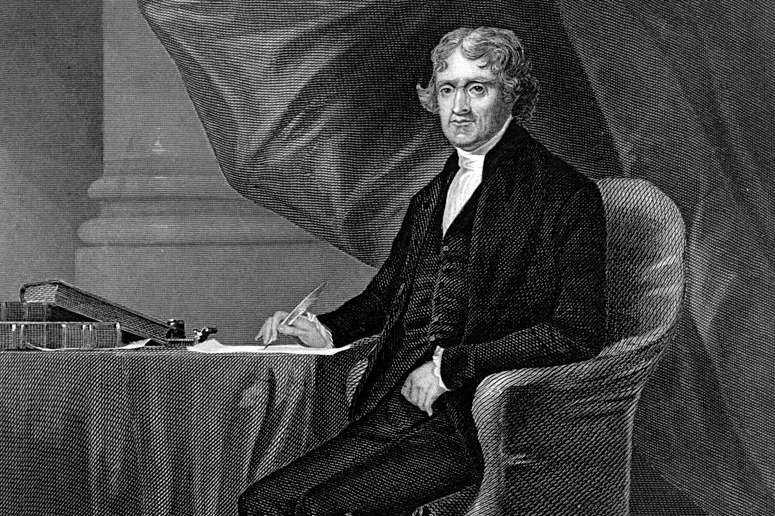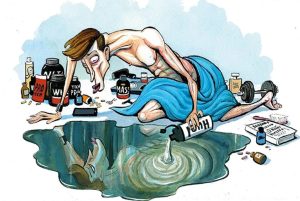About two weeks after I graduated college, I realized I was pretty much useless.
I was in North Carolina for a friend’s wedding, getting ready with the rest of the groomsmen, and I was having a hell of a time ironing my dress shirt. The shirt itself had an ungainly shape that I struggled to map onto the board, and each stroke of the iron seemed to create new creases. My mother handled the laundry at home, and in college I rarely had to dress formally. When I did, I’d transfer my shirts directly from dryer to closet, and that was usually good enough.
Finally, I gave up and asked my friend John for help. John, a confident, capable guy who always made me feel inadequate, agreed. To save me the embarrassment of standing there while he ironed, John asked me to go make some scrambled eggs for the group. Once again, I was screwed. My mother cooked at home, and I had a meal plan at college. Well, I figured, how hard could it be? I cracked some eggs into a bowl, mixed them with a fork, poured them into the pan, turned on the burner…
“What’re you doing?” John called from across the room. Something wrong, apparently. “You don’t cook eggs in a cold pan!” I was mortified. Like that scene in Mad Men when Don Draper fixes Pete Campbell’s sink in front of all the wives. I never wanted to feel that way again.
The situation has since improved. I can iron a shirt. I’m halfway decent at cooking. I can bake bread (of the regular and banana varieties). I managed to do the rewiring necessary to replace a light fixture. I designed, built, and even sold a few pieces of furniture during my stint of Covid unemployment.
I’m not saying I’m omnicompetent. I know better than to mess with the plumbing. Every time I’ve tried, I’ve made it worse. But I don’t feel as helpless as I used to. There’s nothing more humiliating than not knowing how to do something you know you should know how to do. But the converse is also true. There’s no greater pleasure than being able to properly care for yourself, your living space, and your possessions — and, later on, for your wife and children. The former can even lead to the latter. Elizabeth Bennet starts to fall in love with Mr. Darcy when she visits Pemberley for the first time.
One more anecdote: in high school, I bought a cool knife at a flea market. You pressed a button forward, and the blade sprang out the front and locked in place. Push the button the other way, and the blade sprang back. After a few minutes of the old in-out-in-out, the thing broke. The blade stopped locking in place. Normally, I’d have cut my losses. It only cost $20 or so.
But, for some reason, I refused to do so. I found a tiny screwdriver and sat at the kitchen table for hours. My eyes went bleary, but I wouldn’t stop. I removed each internal component, figuring out exactly how it worked before setting it aside. Eventually, I understood the entire mechanism. Once I did, the fix was easy. I was working against the grain of my own mind. My father’s a brilliant mechanic, but my intelligence has always been more linguistic. I’m borderline retarded (literally, as shown by a test) when it comes to spatial reasoning. It didn’t matter. I’d fixed it. It had become mine in a far deeper sense than when I’d handed the vendor some cash earlier that day. I wanted to feel that way all the time.
Our goal should be to create a broadly competent yeomanry, not a society of specialists and consumers. This has always been the American ideal. Look at Thomas Jefferson: statesman, farmer, architect, linguist, naturalist, inventor. In “Self-Reliance,” Ralph Waldo Emerson mocked the “city dolls” who spent their careers chasing high-paying desk jobs in Boston or New York. He preferred a “sturdy lad from New Hampshire or Vermont, who in turn tries all the professions, who teams it, farms it, peddles, keeps a school, preaches, edits a newspaper, goes to Congress, buys a township, and so forth.” Walt Whitman thought the same, contrasting his sturdy pioneers with the dandified aristocracy and developmentally stunted peasantry of Europe. A free man is a capable man. A helpless man is a slave.
There are, of course, economic benefits to specialization. That’s Econ 101. But those benefits must be weighed against its spiritual costs. Taken to its logical conclusion, division of labor would mean that nobody would mow his own lawn, grow his own vegetables, or raise his own children. You’ll own nothing, and you’ll be happy.
The ideal homo economicus would seem to be a man who is maximally efficient in his job but otherwise can’t find his ass with a flashlight. Why learn to amuse yourself when there’s Netflix? Why cook when there’s DoorDash? Why learn your way around town when there’s Google Maps (and all they ask in return is to know all your location data all the time)? Why buy a home when you can rent forever and whine to your landlord when something goes wrong? You can even hire a guy on TaskRabbit to assemble your IKEA furniture, for God’s sake.
The state seems to have uncritically accepted this vision of the good life and is all-in on promoting and subsidizing it. Here’s two ways we can push back:
First, make the Boy Scouts great again. In 2017, a writer named Chris Rio reviewed the 1911 Boy Scout handbook for Cracked.com, back when Cracked was one of the best humor sites around. Rio began with a few jabs at his own lackluster scouting experience. One requirement for the Engineering merit badge, for example, was to “[m]ake a list of 10 electrical appliances in your home.” To be fair, there’s a lot more to it than that, but Rio is setting up a contrast.
In 1911, if you wanted an Agriculture badge, you had to literally grow an acre of corn. Architecture? Design a two-story house and build a three-person shack. Archery? “Shoot so far and fast” with a homemade bow “as to have six arrows in the air at once.” Pathfinding? “Know every lane, by-path, and shortcut for a distance of at least two miles in every direction.”
Rio quips that he’d “be impressed if someone knew all the shortcuts in Mario Kart,” but at this point he’s kind of telling on himself. People actually do learn all the shortcuts Mario Kart. Completionists put in endless hours exploring every cranny of vast open-world games like Skyrim. Why not apply that same energy to learning the physical environment around you and uncovering its secrets? (Pokémon GO almost managed to trick us into doing just that).
Same thing with the archery badge. Young men want to do things that are difficult. That’s why they love video games like Dark Souls and Bloodborne, which eschew the handholding of modern games and embrace the crushing difficulty of yesteryear. Think of any absurdly difficult and time-consuming feat one could achieve in those games, and there’s a YouTube video of somebody doing it.
Beating every boss without taking damage yields a powerful feeling of triumph, I’m sure. All those hours of studying the bosses’ attacks, grinding out experience points, and tweaking your stats in just the right way. Perhaps the resulting high would even be equal in intensity to seeing the sixth arrow leave your bow just as the first hits the ground. But the digital achievement is ultimately hollow. The knowledge you’ve gained applies only within the game world. You’ve leveled up your virtual avatar, not yourself. The ability to keep six arrows aloft at once is arguably as useless as the ability to beat Bloodborne with only your character’s fists, but it has the advantage of strengthening your mastery as an incarnate, embodied being.
If the Boy Scouts can offer (perhaps in a more overtly gamified form) these kinds of hard, real-world challenges, they have a chance of reclaiming some of its lost cultural clout and rebuilding the American yeomanry.
The second is some sort of mandatory national service. If you manage to finish high school lacking in basic competencies, you certainly won’t get any further that way. Military, Peace Corps, AmeriCorps, Civilian Conservation Corps, whatever.
If we want people to truly love the environment, maybe we could even set up some state-subsidized homesteads and kibbutzim. Offer high-school grads a one-year stint where they can tend crops, care for animals, maintain buildings, take turns cleaning and cooking communal meals, and maybe even shoot a coyote or two. No screens. You want entertainment? Sing a song. Put on a play. Expropriating all the land owned by Bill Gates and the Chinese government would give us more than enough to get started on this.
Even without a national service requirement, we could still disincentivize starting college right after high school. People (like me) who do so should be stigmatized as pampered rich kids incapable of appreciating what the university has to offer. The burden to prove otherwise would be on them.
In his memoir, Hillbilly Elegy, Senate candidate J.D. Vance describes how he sprinted through Ohio State in two-and-a-half years. He’d just spent four years in the Marines and didn’t feel like screwing around with a bunch of immature kids seeking to artificially extend their adolescence. The students I knew who came to college a year or more “late” were uniformly impressive.
There are many ways to take a gap year. One option would be to work while taking a class or two at community college. For young Mormons, it’s common to spend a year as a missionary. Catholics, Protestants, and Orthodox should take note. A similar service and/or missions program could boost conversions, increase vocations, and strengthen ties between the churches and their young adult members, many of whom drift away when they leave for college. National Review writer Nate Hochman spent six months scooping ice cream and saving money and another six months bumming around the West with friends, sleeping in his car and rock climbing. It was, he wrote, a “[c]ompletely different level of freedom than the controlled campus environment.”
Freedom and independence can be used as synonyms, but they’re not exactly. Any idiot can be free, unrestrained, uninhibited, unencumbered. It takes a wise and competent person to be independent, self-governing, able to ask or barter for help without becoming helpless, capable of caring for those people and things for which he or she is responsible without the enervating interference of outside forces. These are the people a virtuous republic should aim to produce.


















